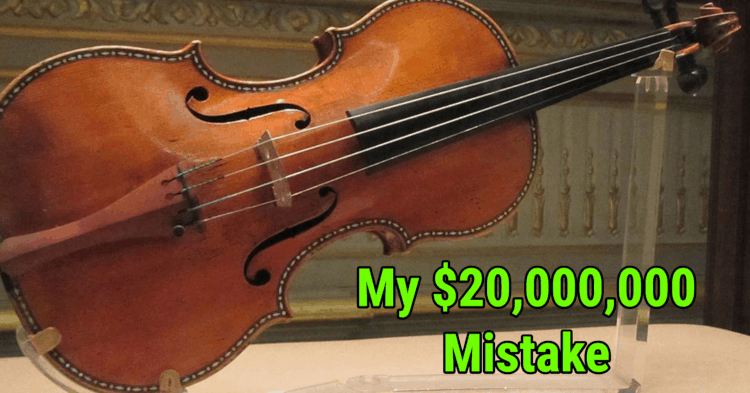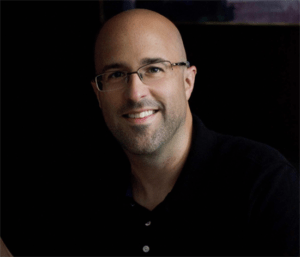Ever wonder how a $20 Million Stradivarius Feels?
Many years ago, my friend and I spent a year attending all sixteen of the Beethoven string quartet performances at Yale University
As well as being an entrepreneur, business owner, and Fortune 500 marketer, I am also a concert violinist.
Don’t be too impressed – today I play mostly at my church for weddings and other special occasions. But I enjoy playing immensely.
But back then, I still retained the musician’s dream of playing the big concert halls so I went not only to listen to beautiful music, but also to imagine being on stage, playing in the quartet myself.
I’m not sure how it started, but my friend and I began going backstage after the performances to speak with the players of the Tokyo String Quartet.
On one such occasion I was given the chance of a lifetime.
But I let it slip by…
Stradivarius, the renowned 17th century violin maker, created only one complete decorated ensemble – 2 violins, 2 violas, 1 cello. While he created hundreds of other instruments that could be used en concerte as an ensemble, he made only one that was conceived as an ensemble.
Musicians lucky enough to play these remarkable instruments have said, “You immediately hear and feel and see that these four instruments were made together. Issues like blend of sound, you basically don’t have to think about it. That work is just done for you by the instruments.”
Each instrument is worth upwards of $20 million. But together they are priceless.
I was lucky enough to hear these instruments played during one of the Beethoven string quartet performances. (During the Napoleonic Wars, both violas were stolen and only one was recovered).
And after the performance, my friend and I went backstage to chat with the musicians. Of course, I admired the instruments.
Truly, I was in awe of them. Not only were they beautiful to look at – 4 of only 11 decorated Strads left in existence – exquisite to listen to, but they had been played by some of the best musicians over the past 300 years.
“Would you like to play it?”
The violinist handed me the $20 million, 300 year old, artistic masterpiece of the greatest instrument maker in history.
I was terrified.
No, not terrified…I was humbled.
Who was I to play this greatest of violins? How could I possibly be worthy?
For baseball fans, it would be like playing with Babe Ruth’s mitt. But times ten that because only Ruth wore his mitt. It would be like wearing the baseball glove worn by the 10 greatest players in history. How could you be worthy? We retire their numbers…who would dare play with their mitt?
I held the decorated Stradivarius (did I mention, one of only eleven still left in existence?) delicately in my hands. I timidly plucked the strings. It did sound different.
Then I handed it back. I didn’t play it. I was presented with greatness, a once in a lifetime opportunity, and I passed on it.
I’ve always regretted that moment.
And I’ve come to realize why I didn’t take the bow that was offered and play the violin.
It wasn’t because of the violin’s worth. It was because of my own worth.
Or rather, what I perceived my worth to be, which was not enough to aspire to such greatness.
I have since overcome this self-limiting mindset. I have since come to realize that greatness is exactly what we are all meant to achieve.
But that most of us do not believe we will ever have it or that we are even worthy of it. Greatness is for someone else. Maybe someone born to it. Maybe someone who’s smarter or better looking, or whatever. “I’ll never be great.”
That self-limiting mindset seeps into everything we do and holds us back from achieving what we were meant to achieve – Greatness.
I see it all the time in business, with owners and entrepreneurs who have a dream but don’t really believe they’ll achieve it.
It would be nice to be a millionaire, but that’ll never be me.
It would be nice to retire early, but that’ll never be me.
It would be nice…but that’ll never be me.
And so the mindset becomes a self-fulfilling prophecy.
When I handed back the Stradivarius violin, I immediately knew that I had missed the opportunity of a lifetime. I went home that night thinking about it, imagining that I had chosen differently, chosen to take the bow, play the violin and make music.
Years later, I was in the Smithsonian with my wife and young son. We walked up to an exhibit with a violin. It was the same one that I had held.
“I once had a chance to play that,” I said.
When you let the moment pass you by because deep down you don’t think you deserve success, that moment sits forever like that violin in a glass case in the museum – untouchable but always in view.
When I was at ADP, I had a chance to sit in on a meeting that the CEO was attending. I probably wasn’t going to get the chance to meet him again.
“Did you know you can’t be found on Google?” I asked him.
Not, hello, it’s nice to meet you. I only had one chance to make an impression.
Later, after I showed him his lack of presence on Google, he asked me to run the digital marketing for all of the ADP payroll and B2B services, a huge break for me that eventually led to promotions and the opportunity to work and build relationships with most of the Corporate Executives.
I passed on playing for greatness once. Never again.





